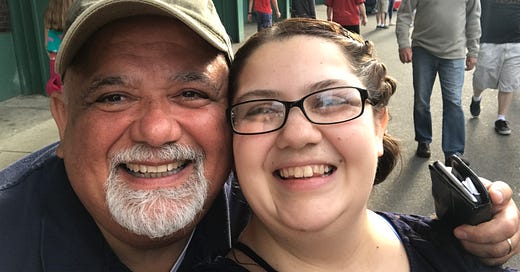“Como Se Dice?” How My Dad Empowers Me to Speak Better Spanish
“Hey, Dad! Quick question, is it apartamento or departamento in Spanish? I don’t want another parqueo situation on my hands."
Without question, my Dad has become my unofficial English-to-Spanish translator. Our latest conversation happened just a few days ago as I sat at the park near my apartment and texted with my Tia Lala back in Chile. I didn’t want to get caught saying another Spanglish word in our exchange, and as usual, my Dad came through.
“You can say both, but in Chile we say departamento,” he explained.
A couple of years earlier, he’d laughed with me as I explained an embarrassing story of a visit to his cousin Nury in Chile. As I made my way from Viña Del Mar to La Serena, I asked my tia if there was any parking near her apartment building.
“Hay parqueo tia en su edificio?” I asked (confidently, I might add).
“Jaja, mijita se dice estacionamiento. Y si, no se precupe, hay adonde estacionarse,” Tia Nury responded.
Face meet palm. I worked hard to avoid these little situations and could always count on my Dad to navigate the intricacies of Spanish and Chilean colloquialisms. Well, at least as an adult I could.
When my siblings and I were kids, my Dad loved letting us say Spanish words wrong because he thought it was adorable. He’d shut down anyone who wanted to correct us, whether that person was a kind stranger or his mama. In fact, I said sesena (sandia/watermelon) and totona (McDonald’s) for way longer than I should have.
But as I grew up, my Dad was always there to help me make sense of the two languages swimming in my head. Throughout college, and even in my professional career as a journalist, my Dad was and continues to be the first person I call to proofread my writing in Spanish. He’s also the most supportive when I know words or Chilean phrases that he doesn’t expect me to know.
I feel very strongly about my roots as a Chilena and love speaking Spanish whenever I can. As a (very white) Chilean immigrant, I’ve straddled this invisible line of being not quite white but also not quite Latina. I’m extremely privileged because of my whiteness to not face a whole of lot discrimination as a Latina, but I haven’t been immune. And there are often times I don’t feel Latina or Chilena enough.
My Dad always makes sure to throw those insecurities right out the window. He calls me his “little Chilena” and celebrates my Spanish-speaking skills whenever he can. When I was in high school, he said one of his proudest moments was when I was inducted into the English Honor Society. But what he doesn’t know is that I’m most excited about making him proud of my Spanish.
I don’t quite think he knows how much his support has meant to me over the years. He’s shown me it’s important to feel proud of who I am, where I came from and to embrace the language of my family. I look forward to the day when he can laugh at my future kids’ Spanglish and hope they turn to him for help as much as I do.




